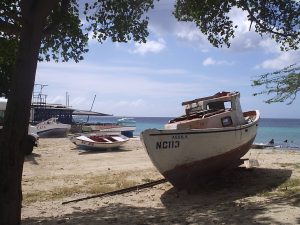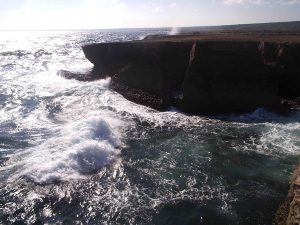
Oswin Chin Behilia is a genuine troubadour: communicative, entertaining, passionate, observant – making acoustic music in a mix of pan-Caribbean grooves. Many of his songs engage the social aspects of life on Curacao in a genre he calls his “social lyrics”.
On this third Otrabanda release several of his songs deal quite specifically and with a greater sense of urgency with recent major historical developments in the political relationship between his native Curaçao with the Netherlands. First and foremost his songs are just plain good music to listen to, sometimes to dance to and more often than not, food for thought.

During a songwriting career that began in the early 1960s Oswin Chin Behilia has been a chronicler of his times besides writing about love and nature. Many of his songs engage the social aspects of life on Curacao in a genre he calls his “social lyrics”. On this third Otrabanda release several of his songs deal quite specifically and with a greater sense of urgency with recent major historical developments in the political relationship between his native Curaçao with the Netherlands. In the time honored fashion of a protest folk singer, through radio play, concert appearances, and even recently on local high school curricula, his lyrics reach both his home audience and Antillean immigrants in the Netherlands, often to chagrin of the powers that be on both sides of the Atlantic.

Much like the calypso that chronicled the goings on of the erstwhile British West Indies, Behilia has penned quite a few Dutch Caribbean classic tracks, often choosing the native Curacaoan tumba and sehú forms or Cuban son montuno as vehicles to tell his tales. As a teenager at the end of colonialism in the Dutch West Indies he witnessed the change when a measure of home rule (autonomy) was reached in 1954. The events of the late sixties culminating in the riots in Willemstad in 1969 saw a sea change in the political coming of age and a demand for even greater social and political independence from Holland. Throughout Behilia continued writing songs about the social and political climate he observed. 2006 marked a major shift in the political relationship of the Netherlands to its six islands in the Dutch Caribbean, Aruba, Bonaire, Curaçao and St. Martin, Saba and St. Eustatius. Referenda were held to determine what the people of the islands wanted in terms of their future status relating to the Kingdom of the Netherlands. Bonaire, St. Eustatius and Saba decided to become special municipalities of the Netherlands while St.Martin and Curacao opted for more self rule to become autonomous entities within the Kingdom (locally referred to as status aparte )which Aruba already has enjoyed since 1986. In affect the federation of the Netherlands Antilles is no more. Behilia campaigned vigorously in the referendum held on May 15, 2009 in which Curaçao voted by a narrow majority to accept the terms of status aparte stipulated in negotiations with the Netherlands. The campaign was heated and controversial and Behilia’s songs were used in radio and internet campaigns to sway voters into the No camp.

In the opening (Zikinzá) and closing Sigi traha e Bom (Keep Working on the Bomb) Behilia passionately and eloquently takes issue with specific historical developments that, in his view, are in the process of ushering in a second phase of (neo)colonial rule. Zikinzá is both the title of a Curaçoan children’s song as well as the onomatopoeia in Papiamentu for the sound of sawing wood. The metaphor being that the legs are being sawed out from under the table. Behilia has never been afraid to tell it like it is, often criticizing the shortcomings of his own island as songs like Zona mi protesta and Bendishon disfrasá on previous Otrabanda releases attest, as well as the track Korupshon included here. First and foremost his songs are just plain good music to listen to, sometimes to dance to and more often than not, food for thought.
